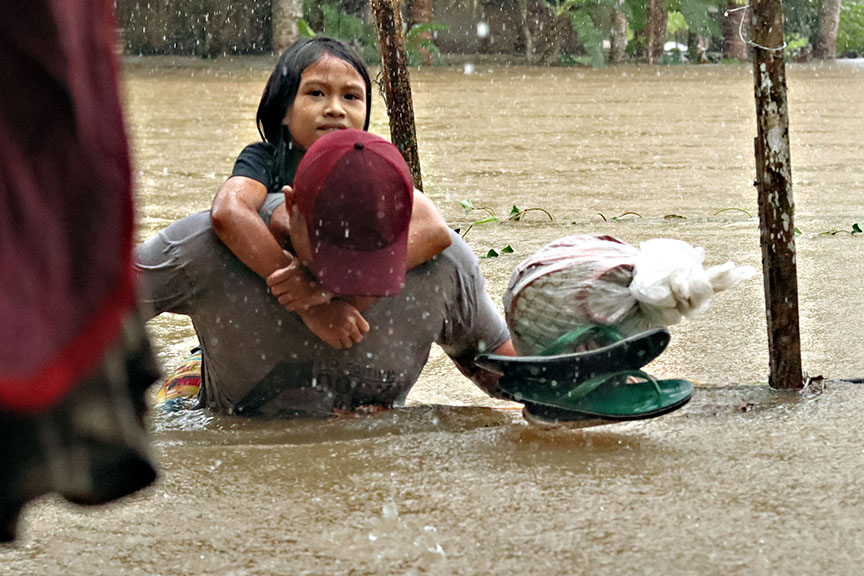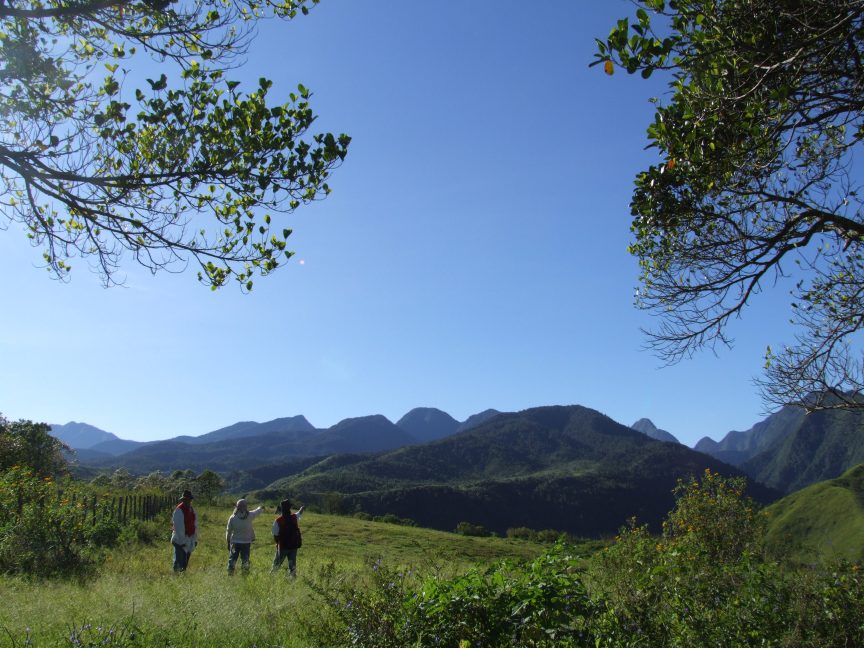 A child holds on tight after she was rescued from her flooded home by one of the residents in Purok 8, Barangay Los Angeles in Butuan City late Tuesday morning (1 June 2021). Continuous rains brought about by Tropical Storm “Dante” have caused flooding in Mindanao and other parts of the country. MindaNews photo by IVY MARIE MANGADLAO
A child holds on tight after she was rescued from her flooded home by one of the residents in Purok 8, Barangay Los Angeles in Butuan City late Tuesday morning (1 June 2021). Continuous rains brought about by Tropical Storm “Dante” have caused flooding in Mindanao and other parts of the country. MindaNews photo by IVY MARIE MANGADLAO
MALAYBALAY CITY (MindaNews / 10 August) – Time to act on climate change is running out, according to the Intergovernmental Panel on Climate Change (IPCC) in the first instalment of its Sixth Assessment Report released Monday.
The report warns that the planet is set to pass 1.50C warming by 2040, and that it is happening almost everywhere on earth.
It says limiting warming to 1.50C or even 20C will be beyond reach without rapid, large-scale reductions in greenhouse gas emissions.
The report warns about the possibility of irreversible changes to the climate, often called tipping points.
It cites, for example, that forests could start to die as temperatures rise, as they become less able to absorb carbon dioxide, leading to further warming. Another possibility is the collapse of the Antarctic ice sheets, leading to rapid sea level rise.
“The probability of low-likelihood, high impact outcomes increases with higher global warming levels,” the report notes. “Abrupt responses and tipping points of the climate system, such as strongly increased Antarctic ice sheet melt and forest dieback, cannot be ruled out.”
It adds that human activities are the main drivers of climate change.
“It is unequivocal that human influence has warmed the atmosphere, ocean and land,” it concludes.
Yet, while the report says that widespread and sustained reductions in emissions of carbon dioxide and other greenhouse gases would limit climate change, it emphasizes that stabilizing global temperatures could take 20-30 years, although benefits for air quality would come quickly.
 Mt. Kitanglad Range, one of the few remaining rainforests in the country, as viewed in Barangay Sil-ipon, Libona, Bukidnon. MindaNews file photo by H. MARCOS C. MORDENO
Mt. Kitanglad Range, one of the few remaining rainforests in the country, as viewed in Barangay Sil-ipon, Libona, Bukidnon. MindaNews file photo by H. MARCOS C. MORDENO
The Paris Agreement aims to stabilize temperatures at 1.50C above pre-industrial levels by the end of the century.
In a press release, the IPCC, however, said climate change is not just about temperature but also “multiple changes in different regions, which will all increase with further warming.”
Among these changes will be more intense rainfall and associated flooding, as well as more intense drought in many regions, disruptions in rainfall patterns, continuing sea level rise throughout the century, amplified permafrost thawing and melting of glaciers and ice sheets, and ocean acidification, the press release said.
The Philippines, Mindanao in particular, has experienced severe climate events linked to the warming of the earth’s temperature, most notable of which was Typhoon Sendong (Washi) in December 2011 and Typhoon Pablo (Bopha) in December 2012.
Sendong triggered flooding in the cities of Cagayan de Oro and Iligan which claimed around 1,500 lives.
Pablo hit Davao Oriental and several other parts of Mindanao, killing over 1,000 people.
Provinces across the island have also experienced more floods and droughts in recent decades. (H. Marcos C. Mordeno/MindaNews)
